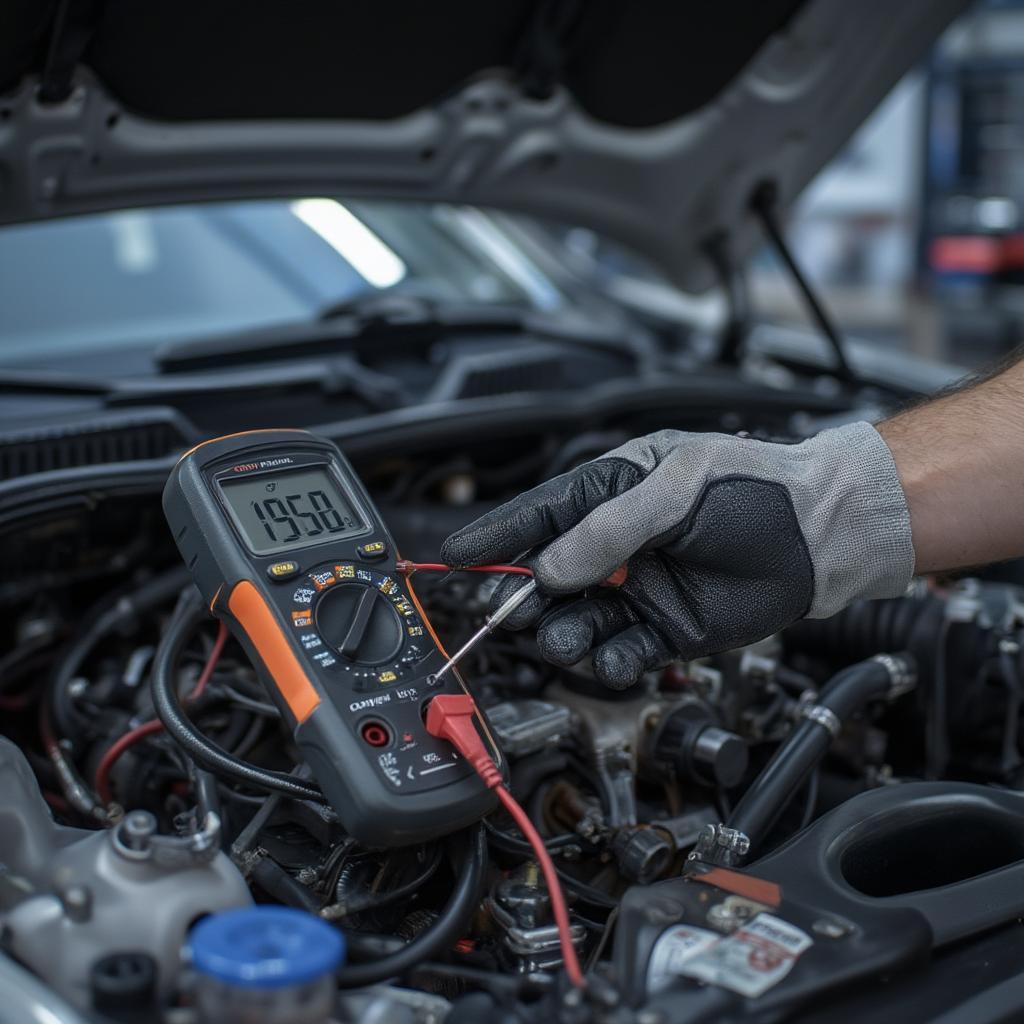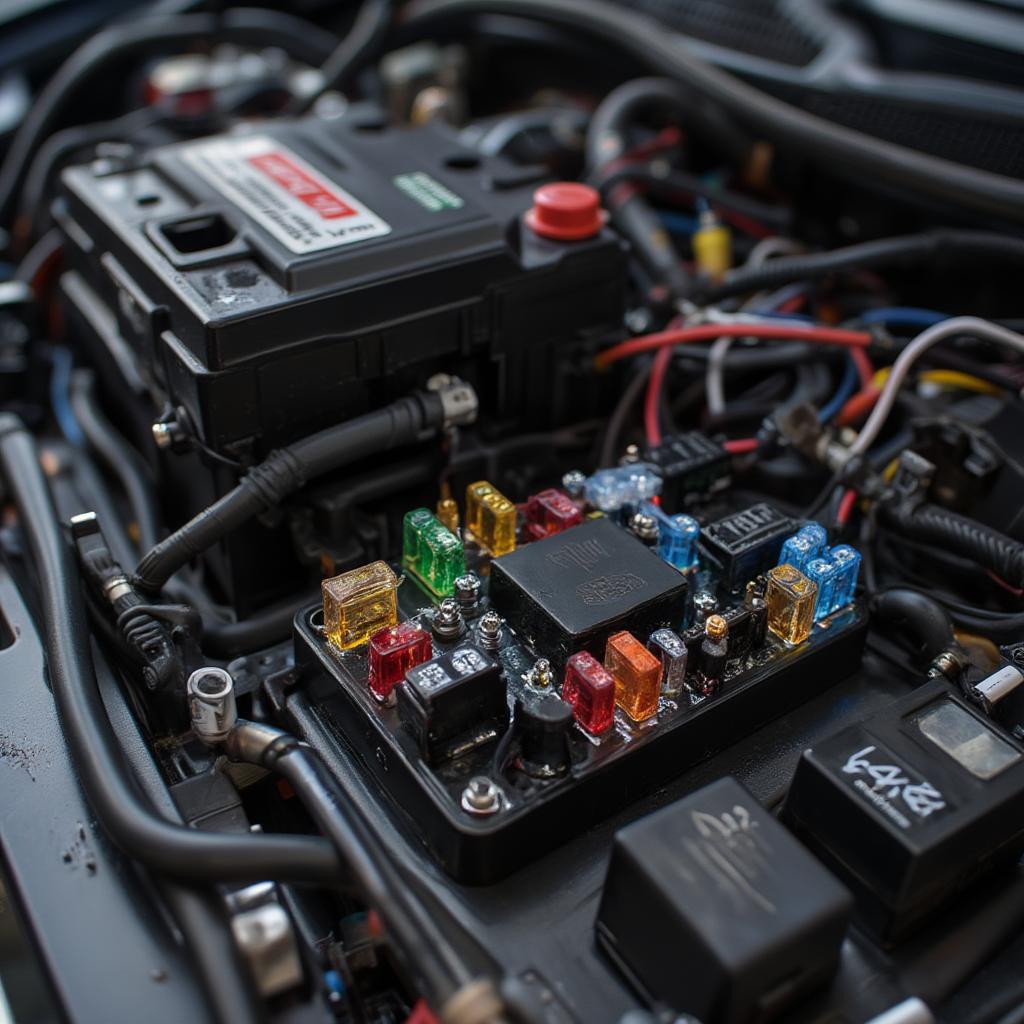Mastering Automotive Electrical Certification: A Comprehensive Guide

The automotive industry is rapidly evolving, and with it, the complexity of vehicle electrical systems. Gaining an Automotive Electrical Certification is no longer just a nice-to-have, it’s becoming a necessity for any aspiring or current automotive technician. This article delves into the world of automotive electrical certification, exploring its importance, types, and how to navigate this crucial aspect of the modern automotive landscape. It’s about more than just fixing wires; it’s about mastering the intricate dance of electricity within today’s vehicles.
The surge in electric and hybrid vehicles, coupled with advancements in driver-assistance systems (ADAS), has made automotive electrical systems increasingly complex. A strong foundation and continuous education in this area is imperative for technicians seeking to remain relevant. An automotive electrical certification demonstrates a commitment to excellence and a proven understanding of these evolving technologies. This can translate to increased earning potential and greater job security. Are you ready to elevate your career?
Why is Automotive Electrical Certification Important?
Keeping Pace with Technological Advancements
Today’s vehicles are rolling computers, and their intricate electrical systems are at the heart of their operations. From engine management and braking systems to safety features and infotainment, electricity is the lifeblood of every car. An automotive electrical certification ensures that technicians are not left behind by these rapid advancements. It covers diagnostics, repairs, and maintenance of these complex systems. Imagine trying to fix a smartphone with a hammer – that’s what working on modern cars without proper electrical certification is like. It’s crucial to stay updated, isn’t it?
Ensuring Safety and Reliability
The electrical systems are not just about functionality; they are directly linked to vehicle safety. Faulty wiring or improper repairs can lead to serious issues, including electrical fires or malfunctions of critical safety systems like airbags and ABS. With an automotive electrical certification, technicians learn to diagnose, repair and maintain these systems correctly, prioritizing both driver and vehicle safety. This isn’t merely about mechanical know-how; it’s about mastering the delicate balance of electrical components, ensuring every journey is secure. That peace of mind is what makes a difference.
Increased Career Opportunities and Earning Potential
Employers value candidates who hold recognized certifications. A specialized automotive electrical certification demonstrates an advanced understanding and commitment to the field. This can unlock new job opportunities and lead to higher salaries. In a market where the demand for skilled technicians is growing, having credentials like these can put you at the head of the line. Think of it as a powerful tool to advance in your chosen profession. Are you ready to open more doors?
Types of Automotive Electrical Certifications
There are various levels and areas of specialization when it comes to automotive electrical certification. Let’s break down some of the most common types:
ASE Electrical Certification
The Automotive Service Excellence (ASE) certification is a widely respected credential in the automotive industry. The ASE Electrical certification focuses on specific electrical components, systems, and diagnostics, covering everything from batteries and starting systems to lighting and advanced electronic controls. It’s considered a benchmark of competence for automotive technicians. Pursuing automotive certification programs near me that align with ASE standards can greatly enhance your prospects.
OEM (Original Equipment Manufacturer) Certifications
Many automotive manufacturers offer specific training and certifications related to their particular vehicle models and technologies. These OEM certifications delve into the unique electrical systems of specific brands, like Toyota, BMW, or Tesla. These certifications often focus on specialized diagnostics, software updates, and repair processes specific to each OEM. For those seeking expertise in certain brands, these certifications are highly sought after.
Specialized Electrical Certifications
Beyond the basics, many specialized areas within automotive electrical systems offer unique certifications. These could include:
- Hybrid and Electric Vehicle Certifications: Focusing on high-voltage systems, battery technologies, and charging infrastructure.
- Advanced Driver-Assistance Systems (ADAS) Certifications: Concentrating on radar, cameras, sensors, and the complex electronics driving these safety systems.
- Automotive Networking Certifications: Delving into the communication protocols, CAN bus systems, and data transfer within vehicles.
These specific certifications cater to technicians seeking specialization in quickly emerging technologies. Do any of these niche areas spark your interest?
“The modern automotive industry demands not just mechanical expertise but a deep understanding of electrical systems. Having the right automotive electrical certification is essential for any technician to thrive and remain relevant.” – Dr. Amelia Chen, Lead Automotive Engineer, AutoTech Innovations.
How to Obtain an Automotive Electrical Certification
The path to gaining certification involves several steps, which might vary based on the certifying body and the specific certification pursued. Generally, it involves:
- Training and Education: Enrolling in a reputable training program or course, like those found at [car repair classes near me].
- Hands-on Experience: Gaining practical experience through work in a professional automotive repair shop is usually a requirement. This often happens in tandem with the learning process.
- Exam Preparation: Reviewing materials, practice exams, and understanding the content outline.
- Certification Exam: Passing the official certification examination.
- Recertification: Depending on the certification, it usually involves periodic recertification and continuing education to stay updated.
The process requires dedication and commitment but is well worth the effort for those seeking to excel in automotive repair. What steps are you ready to take?
Navigating the World of Automotive Electrical Training
Choosing the right training and educational path is a crucial step in earning your automotive electrical certification. Here are some important things to consider:
Selecting the Right Training Program
- Accreditation: Check that the training program you choose is accredited. This ensures a certain quality of education and that it aligns with industry standards.
- Curriculum: Ensure that the curriculum covers all the necessary topics and offers enough hands-on experience. It should be aligned with current industry practices.
- Instructors: Look for instructors with both educational credentials and extensive real-world experience.
- Cost: Training programs can have differing costs and formats, including payment schedules. Make sure to account for tuition fees, testing fees, and the cost of materials.
- Location and Timing: Choose a program that fits your schedule and location. Some offer online courses, while others are entirely classroom-based. Consider what will best fit your learning style. If you’re thinking about [auto body training near me], investigate if they have programs that also incorporate electrical systems.
Practical Experience
Hands-on experience is vital to complement the theoretical learning. Look for opportunities to work in an automotive repair facility to get the real-world exposure you need. Many programs offer internships or apprenticeships to help you gain this crucial experience. It’s where the rubber meets the road, so to speak.
Staying Updated
Technology is evolving rapidly, and electrical systems are no exception. Continuing your education and staying updated on new trends, technologies, and repair methods is essential throughout your career. You can do this through online courses, industry conferences, and manufacturer training sessions. It’s a commitment to lifelong learning to stay at the top of your game.
“It’s not enough to have a single certification; Continuous learning is key to success in the ever-evolving world of automotive technology. Staying updated on the latest trends and diagnostic techniques is crucial.” – Mark Johnson, Lead Technician, Precision Auto Services.
The Future of Automotive Electrical Certifications
With the rise of electric vehicles, the demand for automotive technicians skilled in electrical systems will only continue to rise. As we move towards autonomous driving and increasingly complex electronic control systems, there will be an even greater need for highly specialized technicians. Automotive electrical certifications will become the gold standard for evaluating and selecting candidates. Are you ready to be part of the future of automotive technology?
The Importance of Electric Vehicle Specialization
The shift to electric vehicles (EVs) is one of the most transformative changes the automotive industry has ever seen. These vehicles have significantly more complex electrical systems than traditional combustion engine vehicles. Training for this specific niche is vital to service and maintain the modern EV fleet, and [cert 1 automotive] programs can provide the required fundamental and advanced skills.
Advanced Diagnostic Skills
Modern automotive electrical systems are complex and require advanced diagnostic skills. Technicians need to be proficient in using specialized diagnostic tools, software, and techniques to troubleshoot issues efficiently. Staying ahead of the curve in these diagnostic techniques is crucial for any certified technician. Are you committed to mastering the diagnostic process?
Adapting to New Technologies
The automotive industry is constantly evolving. New technologies, such as autonomous driving, advanced driver-assistance systems (ADAS), and connected car technologies are rapidly changing the landscape. Technicians need to be adaptable and willing to learn new systems to stay relevant in the field. It’s all about embracing change and staying on the forefront of innovation.
Finding the Right Educational Resources
Many educational resources are available for those wanting to gain automotive electrical certification. These range from community colleges and vocational schools to online courses and industry-sponsored programs. It’s all about choosing the one that best suits your needs. Many providers will have [car mechanics courses for beginners] if you need to build up your understanding before embarking on more advanced certifications.
What to Expect in an Automotive Electrical Certification Program
An automotive electrical certification program will cover a wide range of topics, including:
- Electrical Fundamentals: A deep dive into the basic principles of electricity, including voltage, current, and resistance.
- Circuit Analysis: Learning how to read and interpret electrical circuit diagrams.
- Component Identification: Understanding the function of various electrical components in a vehicle.
- Diagnostic Techniques: Using diagnostic tools to identify electrical faults.
- Repair Procedures: Applying best practices for electrical repairs and maintenance.
- Safety Procedures: Ensuring safety while working with electrical systems, especially high-voltage systems in EVs.
These topics provide a well-rounded and solid foundation for any automotive technician. This means understanding the technology in and out. Are you up to the challenge?
“With the continued growth of electric and hybrid vehicles, the value of an automotive electrical certification has never been higher. Technicians with these skills will be highly sought after for years to come.” – David Ramirez, Automotive Service Manager, LeadingEdge Motors.
FAQ – Frequently Asked Questions
1. What is the average salary for a certified automotive electrical technician?
The average salary can vary based on experience, location, and the specific certifications held. However, certified technicians generally earn more than their non-certified counterparts. Many sources list the median range to be between $50,000 – $75,000, but there is potential for higher income, especially in specialized areas.
2. How long does it take to get an automotive electrical certification?
The time it takes to obtain certification depends on the specific program and any prior experience you may have. Some programs can be completed in a few months, while others may take a year or longer. The complexity and scope of the certification determine the overall timeframe.
3. Is prior automotive experience required to pursue this certification?
While some certifications may have no formal prerequisites, many programs prefer candidates with at least some basic automotive knowledge. Hands-on experience is invaluable and is typically gained in tandem with education.
4. What is the difference between an ASE certification and an OEM certification?
ASE certifications are general certifications that apply across a wide range of vehicles. OEM certifications are manufacturer-specific and cover the unique electrical systems of their vehicles. Both can be valuable.
5. Are there online options for automotive electrical certification?
Yes, many online options are available, which can be a convenient way to pursue certification. However, hands-on training is often a requirement for some certifications. Make sure any online programs offer suitable avenues for gaining that experience.
6. What kind of diagnostic tools are used in electrical system repairs?
Technicians often use a variety of tools, such as digital multimeters, oscilloscopes, scan tools, and specialized software, depending on the vehicle system being diagnosed and repaired.
7. How can I stay updated on the latest electrical technology in vehicles?
Continuous education is vital. You can stay updated by taking additional online courses, attending industry conferences, joining workshops, and following trade journals, publications and blogs.

Conclusion
Gaining an automotive electrical certification is more than just a credential; it’s an investment in your future and the future of the automotive industry. The increasing complexity of vehicle electrical systems makes this a vital skill set that will only become more valuable over time. Whether you are just starting out or a seasoned technician, investing time and resources in learning about automotive electrical technology will be a very worthwhile decision. The path might seem like hard work, but the rewards of knowledge and expertise in this constantly evolving field are worth the effort. This field will continue to be important for years to come. Are you ready to be at the forefront of automotive technology?




